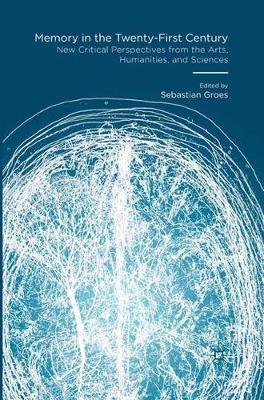Full Product Details
Author: Sebastian Groes
Publisher: Palgrave Macmillan
Imprint: Palgrave Macmillan
Edition: 1st ed. 2016
Dimensions:
Width: 15.50cm
, Height: 2.20cm
, Length: 23.50cm
Weight: 0.652kg
ISBN: 9781349566426
ISBN 10: 134956642
Pages: 400
Publication Date: 04 March 2016
Audience:
College/higher education
,
Undergraduate
,
Postgraduate, Research & Scholarly
Format: Paperback
Publisher's Status: Active
Availability: Manufactured on demand

We will order this item for you from a manufactured on demand supplier.
Reviews
As teacher, writer and editor, Sebastian Groes is one of the most interesting figures of his generation. His project, it seems, is to restore English studies (still languishing after its long dalliance with 'theory') to a central role in our intellectual culture. To achieve this he has drawn widely from other disciplines including the cognitive sciences. He has enlisted poets, novelists, psychologists, neuroscientists and philosophers to his cause. He has brilliantly enlivened and widened that contested space where science and the humanities meet. Memory and consciousness have always been the lifeblood of literary expression; in the past thirty years they have become subjects of scientific enquiry. Groes's passion for both modes of exploration has resulted in this superb collection of essays. - Ian McEwan, Booker Prize-winning author of Enduring Love, Atonement and The Children Act Memory in the Twenty-First Century, edited by Sebastian Groes, is a remarkable achievement. Bringing together an interdisciplinary mix of scientists, cultural critics, philosophers, writers and literary critics, it ranges across a diverse set of topics, including memory as metaphor, anticipation, ecology, subjectivity and even memory's seeming antithesis, forgetting. Readers will find an equally rich range of references, including novels, films, poems and art works, in addition to what seems like the entire scholarly repertoire of works on, about, and relating to memory across the centuries in Western culture. - N. Katherine Hayles, Professor of Literature and Director of Graduate Studies, Literature Program, Duke University, USA
As teacher, writer and editor, Sebastian Groes is one of the most interesting figures of his generation. His project, it seems, is to restore English studies (still languishing after its long dalliance with 'theory') to a central role in our intellectual culture. To achieve this he has drawn widely from other disciplines including the cognitive sciences. He has enlisted poets, novelists, psychologists, neuroscientists and philosophers to his cause. He has brilliantly enlivened and widened that contested space where science and the humanities meet. Memory and consciousness have always been the lifeblood of literary expression; in the past thirty years they have become subjects of scientific enquiry. Groes's passion for both modes of exploration has resulted in this superb collection of essays. Ian McEwan, Booker Prize-winning author of Enduring Love, Atonement and The Children Act Memory in the Twenty-First Century, edited by Sebastian Groes, is a remarkable achievement. Bringing together an interdisciplinary mix of scientists, cultural critics, philosophers, writers and literary critics, it ranges across a diverse set of topics, including memory as metaphor, anticipation, ecology, subjectivity and even memory's seeming antithesis, forgetting. Readers will find an equally rich range of references, including novels, films, poems and art works, in addition to what seems like the entire scholarly repertoire of works on, about, and relating to memory across the centuries in Western culture. N. Katherine Hayles, Professor of Literature and Director of Graduate Studies, Literature Program, Duke University, USA
"""As teacher, writer and editor, Sebastian Groes is one of the most interesting figures of his generation. His project, it seems, is to restore English studies (still languishing after its long dalliance with 'theory') to a central role in our intellectual culture. To achieve this he has drawn widely from other disciplines including the cognitive sciences. He has enlisted poets, novelists, psychologists, neuroscientists and philosophers to his cause. He has brilliantly enlivened and widened that contested space where science and the humanities meet. Memory and consciousness have always been the lifeblood of literary expression; in the past thirty years they have become subjects of scientific enquiry. Groes's passion for both modes of exploration has resulted in this superb collection of essays."" — Ian McEwan, Booker Prize-winning author of Enduring Love, Atonement and The Children Act ""Memory in the Twenty-First Century, edited by Sebastian Groes, is a remarkable achievement. Bringing together an interdisciplinary mix of scientists, cultural critics, philosophers, writers and literary critics, it ranges across a diverse set of topics, including memory as metaphor, anticipation, ecology, subjectivity and even memory's seeming antithesis, forgetting. Readers will find an equally rich range of references, including novels, films, poems and art works, in addition to what seems like the entire scholarly repertoire of works on, about, and relating to memory across the centuries in Western culture."" — N. Katherine Hayles, Professor of Literature and Director of Graduate Studies, Literature Program, Duke University, USA"
Author Information
Sebastian Groes is Senior Lecturer in English Literature at Roehampton University, UK. He specialises in modernist and contemporary fiction, has written on authors including Ian McEwan and Kazuo Ishiguro, and published The Making of London. He is the Principal Investigator of the AHRC and Wellcome Trust-funded The Memory Network.




